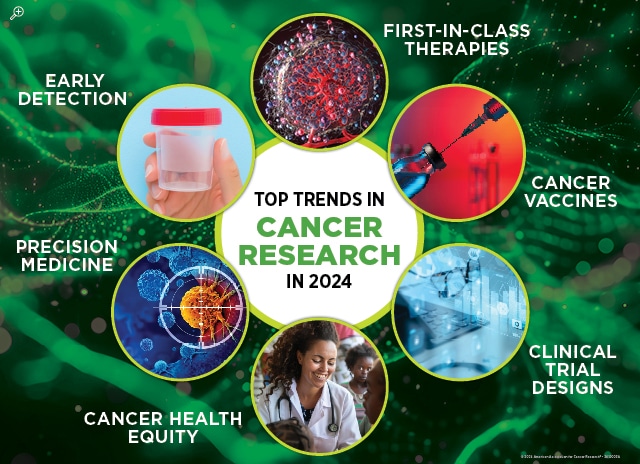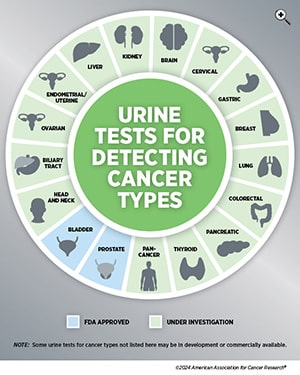What did we learn about cancer in 2024? How did research advance our understanding of cancer? What new approvals are changing how cancer is being treated? What discoveries could lead to novel treatments down the line? What progress was made in finding ways to detect cancer earlier, closing critical care gaps, and expanding care options around the world?
As we approach the end of the year, it is only natural to look back and reflect on the advances made in cancer research in 2024. Cancer Research Catalyst, the official blog of the American Association for Cancer Research (AACR), covered many of the cutting-edge advances from AACR conferences and leading cancer research journals, interviewed thought leaders, and followed the latest U.S. Food and Drug Administration (FDA) oncology drug approvals, among others.
Here is a look at some of the biggest themes to emerge in cancer research in 2024.
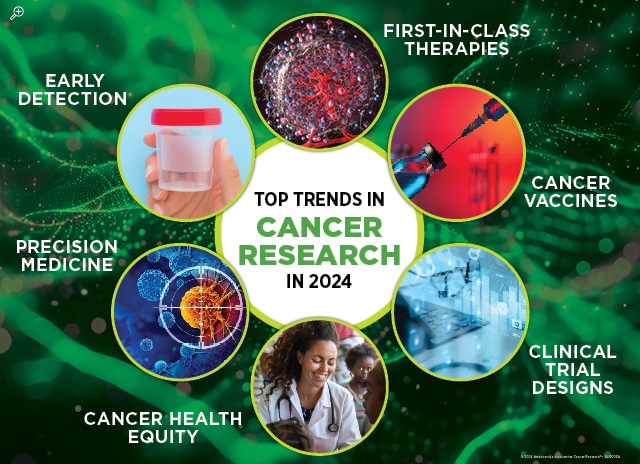
Experts Forecast: A Look Back at a Look Ahead
Our annual Experts Forecast Cancer Research and Treatment Advances series asks prominent cancer researchers in various fields to share predictions for the year ahead. For 2024, AACR President Patricia M. LoRusso, DO, PhD (hc), FAACR, foresaw progress in precision medicine; Catherine J. Wu, MD, FAACR, predicted advancements in cancer vaccines; Paul Workman, PhD, expected a bigger impact from artificial intelligence and other novel technologies in drug discovery; and Robert A. Winn, MD, FAACR, said we would make headway in forging equity in cancer care.
So, what advances did we see in these various areas?
At the AACR Annual Meeting 2024, promising early clinical trial results were presented for two personalized neoantigen cancer vaccines, one for head and neck squamous cell carcinoma (HNSCC) and the other for pancreatic cancer.
Workman mentioned how AlphaFold, an AI algorithm designed to predict the structures of proteins, was already having an impact in the field. The Nobel Committee agreed, as the researchers behind AlphaFold were awarded the Nobel Prize in Chemistry 2024. Two plenaries at the AACR Annual Meeting 2024 also discussed advances in artificial intelligence in oncology and other technologies helping to profile the tumor ecosystem.
LoRusso talked about new approaches with developing drugs for molecular targets, including those thought to be “undruggable,” such as certain KRAS molecular alterations. At the 2024 AACR Special Conference in Cancer Research: Advances in Pancreatic Cancer Research, researchers discussed progress in targeting different RAS mutations in pancreatic cancer, as well as other targets like those with BRCA1 or BRCA2 mutations.
One area Winn specifically mentioned was getting healthy food to cancer patients. At the 17th AACR Conference on the Science of Cancer Health Disparities in Racial/Ethnic Minorities and the Medically Underserved, several intervention programs designed to close care gaps were presented, one of which was a Food Farmacy created to provide fresh produce to those in a food desert. You can find a section below dedicated to more progress being made in addressing cancer health disparities.
Newly Approved Therapeutics: What’s First in Class?
So far, we’ve had over 50 approvals for cancer indications in 2024, including many first-in-class therapeutics:
- Lifileucel (Amtagvi), the first tumor-infiltrating lymphocyte (TIL) cell therapy;
- Tarlatamab (Imdelltra), the first bispecific T-cell engager for a solid cancer type, which simultaneously binds the DLL3 protein on cancer cells and the CD3 protein on T cells;
- Nogapendekin alfa inbakicept-pmln (Anktiva), the first IL-15 receptor agonist, which was approved in combination with Bacillus Calmette-Guérin (BCG);
- Imetelstat (Rytelo), the first direct inhibitor of telomerase;
- Afamitresgene autoleucel (Tecelra), the first T-cell receptor T-cell therapy;
- Denileukin diftitox (Lymphir), the first toxin fusion protein to target IL-2;
- Zolbetuximab-clzb (Vyloy), the first claudin 18.2-targeting therapy;
- Revumenib (Revuforj), the first menin inhibitor; and
- Zanidatamab-hrii (Ziihera), the first HER2-targeting bispecific antibody and the first HER2-targeting treatment for biliary tract cancer.
You can read about all approvals in our quarterly posts: Q1, Q2, and Q3. (Stay tuned for Q4 at the end of the year.)
We also took a deeper dive into the recent approvals that have extended the reach of epidermal growth factor receptor (EGFR) inhibitors to treat lung cancer. And in a post exploring research into thyroid cancer biomarkers, we covered the new indications for selpercatinib (Retevmo), an inhibitor of mutant forms of the RET tyrosine kinase.
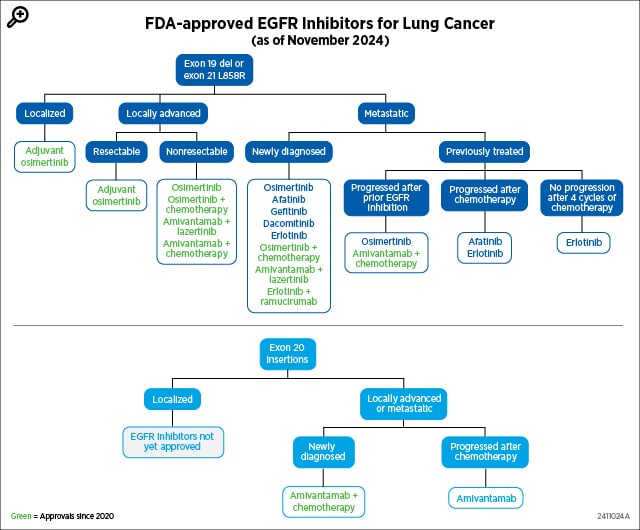
What to Watch For: New Targets, Overcoming Resistance, and Promising Trials
This year, several clinical trials and studies also showed progress with identifying potential new drug targets and exploring ways to overcome resistance to certain therapeutics, and tested novel strategies that could lead to new treatment options down the line.
In biliary tract cancers, we looked at research into overcoming resistance to fibroblast growth factor receptor 2 (FGFR2) inhibitors and targeting other mutations. For brain tumors, we shared a breakdown of the treatments in the pipeline, as presented at the AACR Annual Meeting 2024. Presentations from the AACR Special Conference in Cancer Research: Bladder Cancer: Transforming the Field shared new ways to tackle disease that has become resistant to BCG. The AACR special conference on pancreatic cancer offered updates on trials to help treat patients with cachexia. And recent research showed advances in developing more targeted therapies for sarcomas thanks to sequencing methods that led to the reclassification of certain tumors.
Several studies this year also explored different applications of immunotherapies, including shrinking liver tumors with neoadjuvant immunotherapy, predicting response via the gut microbiome, finding ways to overcome ovarian cancer’s resistance to immunotherapy, and a talk by AACR Past President and immunotherapy expert Philip D. Greenberg, MD, FAACR, on what we can expect for the future of immunotherapy.
Let’s Get Creative: Cutting-edge Cancer Research Approaches in 2024
What could be the next breakthrough idea? Our From the Bench quarterly series highlights some of the most creative approaches being utilized in basic research. In 2024, we wrote about research into molecular jackhammers that blast apart cancer cells and biobots made from human cells. Or you can hear directly from researchers in video interviews detailing a way to turn Tregs against solid tumors, a bacteria-based delivery system for oncolytic viruses, and more. You can also get enlightened about the use of audiovisual pulses to treat chemo brain or how to use “mini-colons” to examine cancer initiation. And don’t get spooked by our Halloween edition, which includes ghost-like transparent mice and using cancer’s own trick of mitochondrial transfer to boost T-cell activity.
Outside of From the Bench, another out-of-the-box idea we wrote about was the design of IgA antibodies to target specific cancer driver proteins, such as KRAS, and sending them into the cancer cell as Trojan horses to drag the protein out and dampen tumor growth.
New Developments in Understanding Cancer Development
This year, several researchers helped improve our understanding of the evolution and development of cancer. One group turned to the animal kingdom, specifically vertebrates, and found characteristics that are associated with cancer prevalence like body mass, longevity, and gestation time. Other researchers looked into the early underpinnings of cancer development, including the mechanisms driving clonal hematopoiesis, changes associated with aging, and the contribution of chromothripsis to cancer development. And to potentially predict how metastatic “seeds” will eventually bloom, some researchers are examining the tree-like pattern in which cancer progresses.
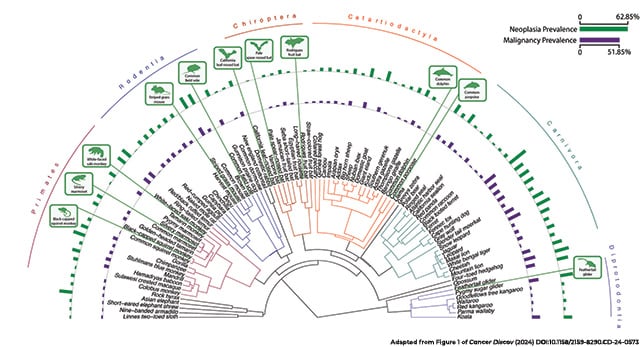
While those groups took a broader view of cancer development, some looked into specific forms of cancer, including the genetic drivers of childhood cancer, the evolution of triple-negative breast cancer, and the potential non-H. pylori causes of gastric cancer.
Answering Age-old Questions About Hematological Malignancies
Some key questions regarding different hematological malignancies were also addressed throughout the year.
How much does age matter when it comes to Hodgkin lymphomas? Researchers found that Hodgkin lymphomas have different molecular features in adolescents and young adults compared with those over 60, which could impact treatment strategies.
What is the risk of developing secondary cancers from CAR T-cell therapies? Maybe not as high as the FDA once believed, as the agency is reconsidering the black box warning on these treatments following studies that have shown the rate of secondary cancers after CAR T therapy is similar to that of other treatments.
How does multidrug resistance develop in acute myeloid leukemia? At the inaugural Blood Cancer Discovery Symposium, researchers presented findings from mouse studies that showed resistance to therapies targeting FLT3, BCL2, MCL1, BRD4, or apoptosis proteins was associated with reduced mitochondrial priming despite these therapies having distinct mechanisms of action.
Designing Clinical Trials: Endpoints, Eligibility, and Dogs
Another topic discussed at the Blood Cancer Discovery Symposium was ways to improve clinical trials for smoldering multiple myeloma. The presenters said that several aspects of traditional trial design would need to change for such trials, including risk stratification, dose optimization, and selection of endpoints. Endpoint selection was a hot topic this year, with another post examining the best practices for collecting and analyzing data on overall survival—considered to be the gold standard endpoint. Meanwhile, the use of surrogate endpoints for treatments granted accelerated approval was called into question when a study found that only 43% went on to demonstrate a clinical benefit in a confirmatory trial.
The FDA also announced guidances on when to broaden clinical trial eligibility criteria—and we wrote about a study that looked at how this could impact patient outcomes in practice. Plus, an examination of clinical trials for companion dogs showed how these types of trials could provide insights into human cancers.
Making Early Cancer Detection More Accessible
This year, the FDA made a few announcements regarding self-collection methods for vaginal samples that could allow for more accessible screening methods for cervical cancer within health care clinics and eventually even within a person’s home. Advanced Research Projects Agency for Health (ARPA-H) also announced a program to support the development of an at-home multi-cancer early detection test that uses either breath or urine samples to catch stage 1 disease. And we examined the many urine tests being studied to detect several individual cancer types. AI may also play a role in the future of early detection, as one session at this year’s AACR Industry Roundtable discussed a program that has shown high accuracy in predicting lung cancer one year prior to diagnosis.
Cancer Health Disparities: Progress and Promise for the Future
Another session at the AACR Industry Roundtable, however, pointed out several hurdles that must still be overcome before AI can make a true impact in clinical practice, one of which is an algorithmic bias that can affect particular groups. Biases against certain groups remain a problem within our society as well, with structural racism having an impact on tumor biology and playing a role in the disproportionate incidence of certain cancers.
But, as the AACR Cancer Disparities Progress Report 2024 highlighted, some progress is being made in addressing disparities, including the overall cancer mortality gap between Black and white populations decreasing from 33% in 1990 to 11.3% in 2020. Another study showed how expanded coverage from the implementation of the Affordable Care Act has improved guideline-concordant colon cancer care for non-white patients, those in rural areas, and those in poorer neighborhoods. Strategies for addressing social determinants of health—such as sources of healthy food, opportunities for exercise, transportation to medical appointments—are also helping to close care gaps. And the hope is that further research into specific disparities, such as the sexual symptoms Black women experience on adjuvant endocrine therapy and a higher propensity for chronic conditions in LGBTQ+ cancer survivors, will lead to changes in how those patients are treated.
Communicating Science to the Public, Policymakers, and Press
One way to address cancer health disparities is by raising awareness within the affected communities, such as through a culturally sensitive video featuring trusted members of that community. Learning how to effectively communicate science to the public was another key theme this year, with a session dedicated to that subject at the AACR Annual Meeting 2024. At Cancer Research Catalyst, we also focused on a new series of explainer posts in 2024 to help the public better understand concepts like synthetic lethality, immunotherapy, liquid biopsy, cancer vaccines, and Lynch syndrome.
In addition to learning how to communicate with the public, researchers also need to understand how to get through to policymakers. They may want to take a lesson from early-career researchers who met with members of Congress to explain the importance of federal support for medical research. Or from a 10-year-old glioma survivor who wowed a crowd of political and scientific leaders at a reception the night before the Rally for Medical Research in Washington, D.C.
Researchers also need to know how to help the media tell effective stories, like those by the 2024 AACR June L. Biedler Prize for Cancer Journalism recipients.
Highlighting Cancer Research Around the Globe in 2024
The message of cancer research’s impact is also one the AACR is dedicated to spreading around the world. This year, that has included initiatives like a virtual panel discussion held on World Cancer Research Day, empowering young researchers through the Global Scholar-in-Training Award (GSITA), enchanting researchers in Brazil during the AACR on Campus program, eliminating membership dues for those in countries building cancer research capacity, and highlighting exciting research and progress in China, featured in a special collection in Cancer Discovery. The AACR Annual Meeting 2024 also included sessions on the work being done to help expand access to cancer care here and abroad as researchers everywhere work toward the ultimate goal of preventing and curing cancer.
We look forward to writing about all the advances in cancer research that 2025 will bring. Stay tuned!
Subscribe to Cancer Research Catalyst to make sure you don’t miss anything!
The post Year in Review: What Themes Emerged in Cancer Research in 2024? appeared first on American Association for Cancer Research (AACR).
